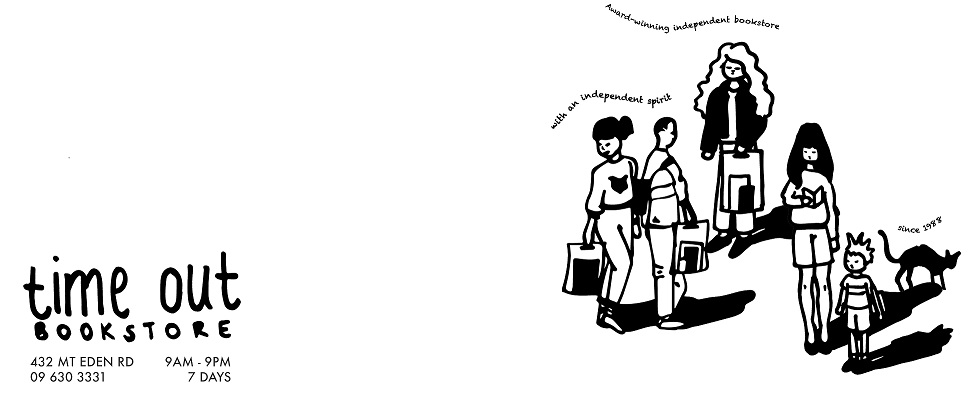All Tomorrow's Poets 2016: Samuel Te Kani
In our final interview before National Poetry Day, Cait meets Samuel Te Kani to talk about call-out culture and being a creative in Auckland.
Cait: Sam! How did your writing practice begin?
Sam: I had this romantic idea about myself when I was a teenager that I’d be a writer, so I had that incentive. I was motivated more by the title than by any kind of practice, to begin with. I guess that might be a millennial thing, I don’t know… But it came from idolising writers myself.
C: Anyone in particular?
S: Oh, Iris Murdoch and [Haruki] Murakami. Because they were next to each other at the library. [laughs] That’s how I discovered them simultaneously. I fell in love with the relationship between a writer and a reader who had just found their writing really haphazardly–– that that contingency could be so fucking profound.
Oh, also, I’ve been really interested in the occult since I was about fourteen. Textual interests: THE OCCULT.
C: You mentioned in a past reading that you have used reading/writing to contextualise feelings of alienation.
S: Yes! Acquiring writing as a weapon, which I don’t think I necessarily do consciously–– though, there are a bunch of people in Auckland that I’ve fallen in with who are, by osmosis, teaching me how to do that weaponised writing. Because I fell in love with prose first. I’ve had to really laboriously access poetry–– I was all about sci-fi and secondhand modernist lit first, because that was accessible. Now I have a bunch of activist friends and a bunch who are sociology majors and it’s nice to have their writing as examples of some use other than escapism. Even if my first loves were all escapists.
C: It sounds like they form an important writing community around you.
S: Yeah! That’s what I went to university for. I wanted to write, and I wanted a community of like-minded individuals––which is actually something I’ve become less enamoured with. Yes, like-minded people are great, but I’m such a sucker for confirmation biases. Anyway, I thought university was going to provide that but I became so disillusioned there. Now I’ve found it here, just from living and working on K Road. For a very long time, K Road’s been a Bohemian Mecca or whatever. I know I should feel awkward or embarrassed to say that but definitely, it is.
C: Owen [Connors] mentioned that you would hate to be referred to as a poet.
S: No, don’t call me a poet. [laughs] Not that I have an aversion but… that would definitely feel uncomfortable for me. [Reading at National Poetry Day] is cool, I like doing things that make me feel uncomfortable. Writing poetry definitely makes me feel uncomfortable, it’s not something that I’m confident with. But that’s great, that’s how you give yourself range.
C: What are you working on at the moment?
S: I’m doing some work for Vice, which is great. They’ve given me creative freedom. I made a video work for them and now they’ve asked me to go and see Poi E. I gave them a piece about call-out culture where I was calling it proto-fascist [laughs] and I hope they run it because it seems so relevant right now. We’ve got this virtual space that’s meant to supplement social reality and which should by definition be democratic, and it’s become this non-safe zone. It’s a minefield, you know. You never know what’s going to trigger someone, and I’m not saying we should blunder through being indifferent to difference. But we need to find a language that’s not as violent to maneuver around difference–– not just name an enemy and blast them to Hades.
It’s important that people are being engaged, not pushed out like a splinter. A language of call-out also isn’t delicate enough to properly maneuver the intersection of race and class. You just can’t lump them together. Good times though [laughs]. What is the logic of that language?
It’s inherently violent and I wonder what people are trying to pull off. Are they trying to destroy people, or are they trying to enact some kind of pedagogy?
C: Owen and Greg [Kan] have both mentioned a commitment to locating their creative practices in New Zealand. Is that something that is important to you?
S: What is the main complaint of anyone who is dreaming of going to London or New York? They’re going because they don’t think anything is happening here. But why is that? Because each successive generation falls into that trap of dreaming on a global scale. Which is a really hegemonic sentiment. It’s a very capitalist notion too, that you can’t enact anything if you’re not in those cities of control. We’re the youngest country in the fucking developed world. We’re a country that’s still in it’s adolescence, and is still vital. If you dream [of going overseas] it’s because you’ve chosen that narrative. It takes a lack of nerve and a lack of vision to say there’s nothing in Auckland. There are a lot of people living in Auckland, babe. [laughs] It’s a pretty big place.
Sam will be reading for us at All Tomorrow’s Poets on the 26th of August at 6pm.
Read Sam’s work for VICE here






